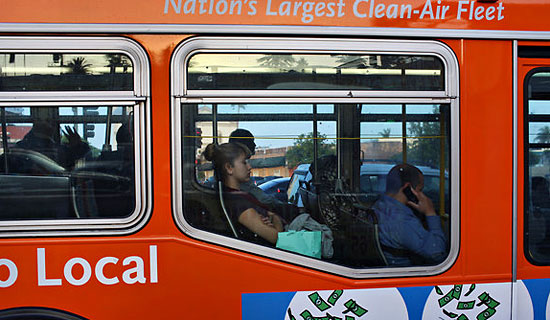Students fare well on Metro
May 22, 2014
When Metro’s board voted to raise fares today, students got a hall pass.
Metro’s Board of Directors froze student fares at their current rates, while directing staff to explore creating a diversion program to keep fare-evading young people out of the criminal justice system. The action came in response to a motion by Supervisors Mark Ridley-Thomas, Zev Yaroslavsky and Don Knabe, and Mayor Eric Garcetti.
The decision to spare students came after a marathon hearing at which nearly 140 people testified against the fare hikes. Overall, Metro’s base fare will increase by 25 cents to $1.75 this September, while weekly passes will rise from $20 to $25 and monthly passes from $75 to $100. At the same time, the board also voted for the first time to bring free transfers, good for two hours of travel, to the Los Angeles transit system, doing away with the long-running practice of charging $1.50 for each leg of a rider’s journey. The board voted 12-1 to approve the changes, with Supervisor Gloria Molina casting the lone dissenting vote.
The move to focus on students calls attention to one of Metro’s key constituencies.
Metro spends about $10 million a year to subsidize fares for K-12, college and vocational students, agency spokesperson Paul Gonzales said. That translates to big savings for individual riders over time—for example, student monthly passes are just $24 instead of the normal $75. Those discounts are critical for students like Samantha Healy, 15, a sophomore at the Ramon C. Cortines School of Visual and Performing Arts.
“Our families have a lot to pay for already because when you’re a student there’s a lot of stuff you have to do,” Healy said. “It gets expensive.”
Another student interviewed at the Civic Center subway station, India Barrett, said Metro often is the only way she and her friends can get around.
“I think it’s a good idea for fares to stay low because students take the train all the time,” Barrett said. “Parents don’t have the time to take kids everywhere they need to go.”
In April, more than 2 million rides were taken by students during the week, accounting for 10% of Metro’s weekday ridership.
And there’s still room for more to jump aboard. According to a 2009 survey, 51% of L.A. County students aged 5 through 15 usually took private vehicles to school—many doing so even when the trip was a half mile or less. That’s 7% above the national average, said Jessica Meaney, the Southern California policy director for the organization Safe Routes to Schools. Meaney said Thursday’s action represents a step toward getting more families to make use of the transit system.
“Removing barriers for students will increase ridership and help Metro achieve its regional goals,” Meaney said.
For students like 15-year-old Trecey Dory, it all comes down to basic economics.
“Increasing fares? Yeah, that would suck,” Dory said. “It’s hard enough for me to scrape up the $24.”
Tululla Steele, 15, said she hasn’t applied for student fares because she hasn’t gotten an identification card from her school yet. She questioned the logic of raising fares in the first place.
“It is public transportation, after all,” Steele said. “It’s supposed to be affordable.”
Beyond the economic issue, some have complained that citations for fare evasion unnecessarily criminalize young people. The motion approved by Metro’s Board of Directors seeks to change that.
“It pushes to decriminalize a system which gives an adult a ticket and a kid a record,” Mayor Garcetti said.
In approving the motion, the board directed the agency’s staff to report back in September on creating a diversion program, which could include things such as online education and community service in lieu of court appearances and heavy fines. The motion also suggests looking into possible legislative fixes; most adult violations were diverted to Metro’s administrative Transit Court in early 2012, but the L.A. County Superior Court requires juveniles to appear because of state law, said Duane Martin, Metro’s executive officer in charge of transit security.
Out of 110,073 total fare evasion tickets issued in 2013, 10,073 of them went to minors, about half between the hours of 3 p.m. and 6 p.m.
Posted 5/22/14













 405 bridge work causes a stink
405 bridge work causes a stink

